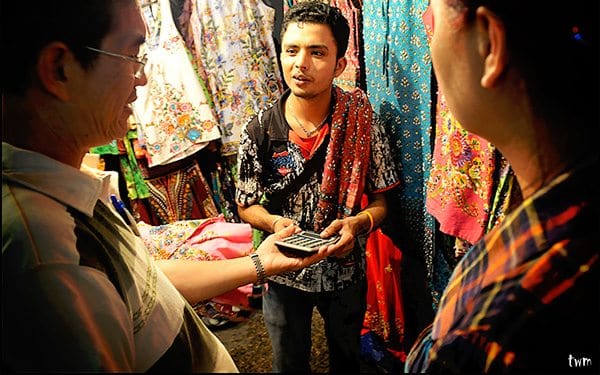It was late and I could see the stars, not because stars shine through the pollution of the Bangkok sky but because my vision was blurred and my eyes were so shaky that the neon lights of the clubs, bars, or wherever the hell I was in the capital of Southeast Asia, were a light in the sky above me.
I knew it was time to go home so I stumbled to a row of cabs.
“Mister, Mister, where you go?” The cabbie was looking my way and sizing me up. I could see baht signs storm around his head as he guessed how drowned I was in the drink.
“Sii Yek Huay Kwang,” I replied indicating that my abode is near the Huay Kwang MRT stop and its accompanying intersection.
The driver stopped for a moment and considered. I knew he was about to give me a price. I knew it was gonna be slightly deflated than if I hadn’t spoken to him in Thai.
“Neung loy haa sip.”
I shake my head, one-fifty to go from Sukhumvit to Huay Kwang? He is as crazy as I am intoxicated.
“Chai meter kap.”
He looked to see if there were any other drunks in the vicinity. He saw none. He shrugged then pointed to his bee colored cab.
We buzzed up the highway and I collapsed into the hive of my home pollinated with contentment. It only cost me sixty baht. He kept the meter on the whole time. While I may not have saved a ton of money, everything counts in small amounts.
Vacationing in Thailand is great, especially for westerners whose inflated economies make a trip to this tourist destination a very feasible economic trip.
However for those who live in Thailand long term, especially for those living on Thai wages, life can necessitate more frugality.
Learning Thai is an excellent way to learn about and get better deals. From the grocery store, to the theatres, to your relations with others, being able to speak the native language of the country will not only save you money but will also increase your cultural capital.
Using your Thai to negotiate taxicab prices is by far the easiest form of negotiation and the one that I tend to use most often but there are other sales and deals that you can get as well.
You know how in your home country the grocery store has membership deals for members? Well, surprise, surprise: many shops in Thailand do as well, so when the clerk is asking you something besides “Sabai dii mai ka,” she’s probably asking you if you’re a member.
Recognizing the question and being able to whip out your card will save you some extra sticky rice money.
Grocery stores aren’t the only places that offer deals to members. Many restaurants, like chain café Greyhound, offer price reductions to cardholders of certain banks. For instance, if you use a Citibank card you get a certain percentage deducted from your meal.
How would you know this though — it’s advertised in Thai. Who would have thought a foreign country wouldn’t cater to foreigners all the time?
This is also true at movie theatres where discounted tickets are given to people with certain popular bank cards. If your Thai is fluent you can ask the ticket seller what the best deal is and they will gladly help you out. Of course you can try to stumble your way through with English but since most of the time the staff’s English is basic it can be a difficult linguistic labyrinth to navigate.
Better to let the tones of Thai rise and fall off your tongue than spend your days chasing after clarity.
All of these suggestions also point to how learning Thai increases your cultural capital as well. When you speak the same language as the locals, you become privy to the sort of information that Thais see as common sense. This includes the average price of things, where and when to go to the markets, along with where the best goods are.
It also includes making connections to get better jobs, into better clubs, and to have the sort of bourgeois lifestyle we all desperately long for.
The cultural capital also extends into the world of emotional labor.
This is especially true with relationships, as you’ll not only know how many buffalo you need to get for your boo’s family, but you’ll also know how to negotiate the debt of sin sod (the Thai dowry system) with them.

By Emily Tan (CC BY 2.0 licence)
If you can tell your precious bride to be exactly how broke you are, how much credit card debt you are in, how you’ve defaulted on multiple student loans, and how your home country is on the brink of economic collapse in her native tongue, she will no doubt find it much easier to jettison you, making your search for a newer, less fiscally concerned lady smooth sailing.
For those of you who engage with the rougher sex, speaking to them in their native language will help you shirk the domestic duties that they may expect of you.
Screaming at them in English about doing their dishes will come to naught, but surely the same shrieks in Thai will make them scurrying to the sink, sponge and soap in hand. When you’ve been working all day the last thing you want to do is come home to a second shift after all. Best to cut out the time consuming emotional negotiations and stick it straight to the heart.
When the economy has encompassed all facets of life, when everything comes with a price tag, putting in the work of learning the language and lingo of the world around you may see you with some extra heavy lifting on the front end but will pay off in the long run through the economic and emotional savings.
Plus it’s always nice to be able to tell the cabbie where home exactly is, no matter your drunken slur.
Featured image is by Jason D’ Great and used under a CC BY-ND 2.0 licence


